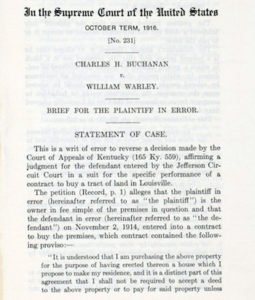
*On this date in 1917, Buchanan v. Warley was decided. In this case, the United States Supreme Court addressed the civil government-instituted racial segregation in residential areas.
The Court held unanimously that a Louisville, Kentucky city ordinance prohibiting the sale of real property to Blacks in white-majority neighborhoods or buildings and vice versa violated the Fourteenth Amendment's protections for freedom of contract. The ruling of the Kentucky Court of Appeals was thus reversed. The city of Louisville had an ordinance forbidding any Blacks to own or occupy any buildings in an area where a greater number of white persons resided and vice versa.

In 1915, William Warley, the prospective Black buyer and an attorney for the National Association for the Advancement of Colored People (NAACP), made an offer to Charles H. Buchanan for his property in a predominately white neighborhood. Prior state court rulings had overturned racial zoning ordinances on the grounds of the "takings clause" because of their failures to grandfather land that had been owned before enactment. The Court, in Buchanan, ruled that the motive for the Louisville ordinance, separation of races for purported reasons, was an inappropriate exercise of police power, and its insufficient purpose also made it unconstitutional.
Historic U.S. Cases 1690-1993:
An Encyclopedia New York
Copyright 1992 Garland Publishing, New York
ISBN 0-8240-4430-4